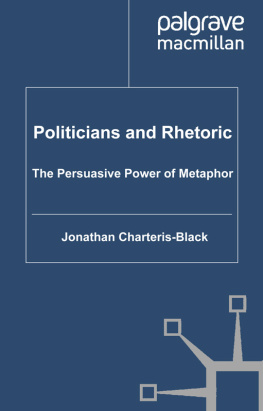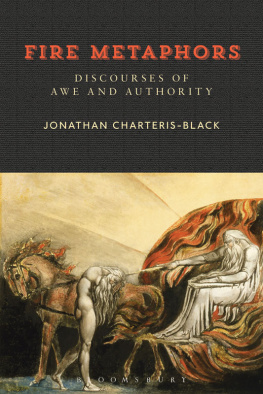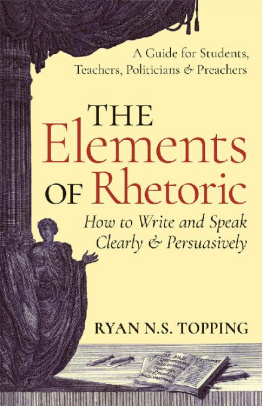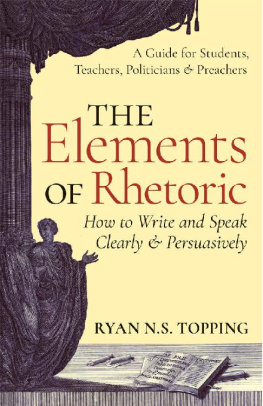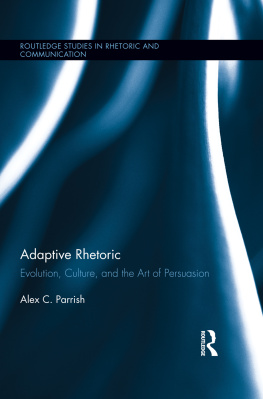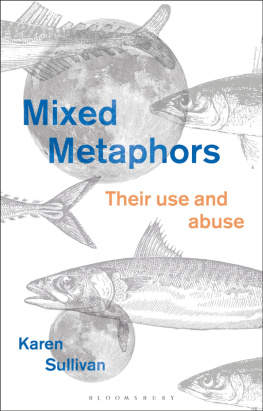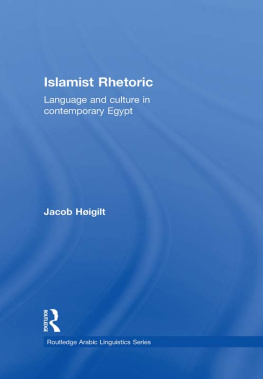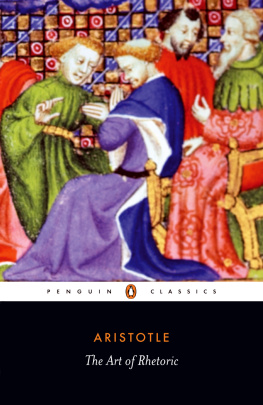Politicians and Rhetoric
Also by Jonathan Charteris-Black
THE COMMUNICATION OF LEADERSHIP
CORPUS APPROACHES TO CRITICAL METAPHOR ANALYSIS
GENDER AND THE LANGUAGE OF ILLNESS (with Clive Seale)
Politicians and Rhetoric
The Persuasive Power of Metaphor
Second edition
Jonathan Charteris-Black
University of the West of England, UK


Jonathan Charteris-Black 2005, 2011
All rights reserved. No reproduction, copy or transmission of this publication may be made without written permission.
No portion of this publication may be reproduced, copied or transmitted save with written permission or in accordance with the provisions of the Copyright, Designs and Patents Act 1988, or under the terms of any licence permitting limited copying issued by the Copyright Licensing Agency, Saffron House, 6-10 Kirby Street, London EC1N 8TS.
Any person who does any unauthorized act in relation to this publication may be liable to criminal prosecution and civil claims for damages.
The author has asserted his right to be identified as the author of this work in accordance with the Copyright, Designs and Patents Act 1988.
First published 2005
Second edition published 2011 by
PALGRAVE MACMILLAN
Palgrave Macmillan in the UK is an imprint of Macmillan Publishers Limited, registered in England, company number 785998, of Houndmills, Basingstoke, Hampshire RG21 6XS.
Palgrave Macmillan in the US is a division of St Martins Press LLC, 175 Fifth Avenue, New York, NY 10010.
Palgrave Macmillan is the global academic imprint of the above companies and has companies and representatives throughout the world.
Palgraveand Macmillan are registered trademarks in the United States, the United Kingdom, Europe and other countries.
ISBN 9780230251649 hardback
ISBN 9780230251656 paperback
This book is printed on paper suitable for recycling and made from fully managed and sustained forest sources. Logging, pulping and manufacturing processes are expected to conform to the environmental regulations of the country of origin.
A catalogue record for this book is available from the British Library.
Library of Congress Cataloging-in-Publication Data
Charteris-Black, Jonathan, 1955
Politicians and rhetoric : the persuasive power of metaphor /
Jonathan Charteris-Black. 2nd ed.
p. cm.
Includes index.
ISBN 9780230251656 (alk. paper)
1. Metaphor. 2. RhetoricPolitical aspects. I. Title.
P301.5.M48C486 2011
825.9109dc22 2011013740
10 9 8 7 6 5 4 3 2 1
20 19 18 17 16 15 14 13 12 11
Printed and bound in Great Britain by
CPI Antony Rowe, Chippenham and Eastbourne
Speech was given to man to enable him to conceal his thoughts.
(Fournier LEsprit dans lHistoire)
The task will be hard. There may be dark days ahead , and war can no longer be confined to the battlefield . But we can only do the right as we see the right, and reverently commit our cause to God.
(George VI Speech on outbreak of war)
Make sure that we are talking with each other in a way that heals, not a way that wounds.
(Barack Obama Memorial Service for
the victims of the shooting in Tucson,
University of Arizona, January 2011)
Contents
List of Figures
List of Tables
Preface
It has always been preferable for the governed to be ruled by the spoken word rather than by the whip, the chain or the gun. For this reason we should be happy when power is based at least to some extent upon language; at least when our leaders are taking the trouble to persuade us, we have the choice of accepting or rejecting their arguments. Leadership is a social act which requires two parties: individuals who are gifted in the arts of self-representation and others who are ready to follow when they are convinced by rhetoric. The language of persuasion looks both outwards and inwards: it promises a better future often based on what is wrong with the present; but it communicates this vision by activating deep-seated ideas, values and feelings that are hidden within the audience. Successful politicians are those who have credible stories to tell, who can involve us with the drama of the present by explaining in simple terms what is right and wrong and who can convince us that they are better than their opponents.
In this second edition I have analysed the rhetorical use of language of three additional politicians to produce a study of nine politicians four British and five North American who have demonstrated great success in their ability to persuade. I hope to explain how their use of language created credible and consistent stories about themselves and the social world they inhabit. I hope to explore their use of metaphors, the nature of their myths and show how language analysis helps us to understand how politicians are able to persuade.
Persuasion, Speech Making and Rhetoric
1.1 Language and politics
Within all types of political system leaders have relied on the spoken word to contrast the benefits that arise from their leadership with the dangers that will arise from that of their opponents. The more democratic societies become, the greater the onus on leaders to convince potential followers that they and their policies can be trusted. As Burns (1978: 18) explains: Leadership over human beings is exercised when persons with certain motives and purposes mobilize, in competition or conflict with others, institutional, political, psychological, and other resources so as to arouse, engage, and satisfy the motives of followers. In this book I illustrate how, in democracies, those who aspire to political leadership persuade their followers through their command of rhetoric and their skill in using metaphor.
Voters make decisions based on their judgements of the honesty, morality and integrity of politicians. These views arise from considerations such as the consistency of actions with words and the efficacy of political arguments. However, they are also influenced by impressions arising from a politicians style and self-presentation. Presentation is gauged through eyes, hair, height, body shape, dress and through a range of bodily mannerisms, such as gaze and gesture. Politicians design their own style of leadership through the cumulative effect of characteristics over which they have some control. For example, they undertake symbolic actions displays of health, vigour and physical prowess, such as engaging in a sport that convey a symbolic meaning to followers. With the growth of media, appearance and visually based verbal methods, such as metaphor, are increasingly persuasive. We are only partially conscious of how a bundle of interacting attributes influence our judgements of a candidates credibility as a leader. The purpose of this second edition of Politicians and Rhetoric is to raise further our awareness of these persuasive methods to guide us towards where our trust might best be placed.
The spoken language is the primary mode of communication in the gentle arts of persuasion and impression management because it projects shared social beliefs about what is right and wrong so that alliances can be formed around these beliefs. Spoken strategies include humour, metaphor and the telling of myth. I investigate the rhetoric of four British and five American politicians who are recognised as the most persuasive exponents of these arts. I will argue that their choice of metaphor is essential to their persuasiveness. I will demonstrate the cognitive and affective appeal of metaphor and illustrate how it contributes to persuasion. This, I suggest, is because it exploits subliminal resources that are aroused non-verbally and then developed through language. The subliminal potential of metaphor is central to the performance of leadership.
Next page
